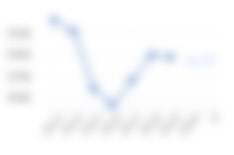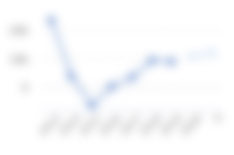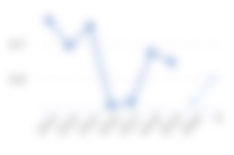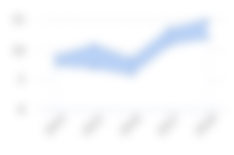JHX — James Hardie Industries Share Price
- AU$19.48bn
- AU$26.05bn
- $3.88bn
- 70
- 49
- 54
- 61
Growth & Value
| 12m Forecast Rolling | Industry | Market | |
|---|---|---|---|
| PE Ratio (f) | 18.78 | ||
| PEG Ratio (f) | 1.71 | ||
| EPS Growth (f) | 12.36% | ||
| Dividend Yield (f) | n/a | ||
| Valuation (ttm) | Industry | Market | |
|---|---|---|---|
| Price to Book Value | 2.13 | ||
| Price to Tang. Book | n/a | ||
| Price to Free Cashflow | 44.97 | ||
| Price to Sales | 3.28 | ||
| EV to EBITDA | 21.7 | ||
Shareholder Activity
| Type | Buy / Hold / Sell |
|---|---|
| Institutions | |
| Directors | |
| Community |
Guru Screens
Quality
| Name | Industry | Market | |
|---|---|---|---|
| Return on Capital | 3.06% | ||
| Return on Equity | 4.63% | ||
| Operating Margin | 9.62% | ||
Financial Summary
| Year End 31st Mar | Unit | 2021 | 2022 | 2023 | 2024 | 2025 | 2026E | 2027E | CAGR / Avg |
|---|---|---|---|---|---|---|---|---|---|
| Total Revenue | $m | 2,908.7 | 3,614.7 | 3,777.1 | 3,936.3 | 3,877.5 | 4,831.27 | 5,499.2 | 8.27% |
| Operating Profit | m | ||||||||
| Net Profit | m | ||||||||
| EPS Reported | |||||||||
| Diluted Normalised EPS | |||||||||
| EPS Growth | % | -11.02 | +64.17 | +11.53 | +3.7 | -9.12 | -1.92 | +14.78 | n/a |
| PE Ratio | x | ||||||||
| PEG | |||||||||
| Profitability | |||||||||
| Operating Margin | % | ||||||||
| ROA | % | ||||||||
| ROCE | % | ||||||||
| ROE | % | ||||||||
| Cashflow | |||||||||
| Op. Cashflow ps | |||||||||
| Capex ps | |||||||||
| Free Cashflow ps | |||||||||
| Dividends | |||||||||
| Dividend ps | |||||||||
| Dividend Growth | % | ||||||||
| Dividend Yield | % | ||||||||
| Dividend Cover | x | ||||||||
| Balance Sheet | |||||||||
| Cash etc | m | ||||||||
| Working Capital | m | ||||||||
| NFA | m | ||||||||
| Net Debt | m | ||||||||
| Book Value | m | ||||||||
| Diluted Weighted Average Shares | m | ||||||||
| Book Value ps | |||||||||
Other Ratios
| Leverage (ttm) | Total | - Intang | + Pension |
|---|---|---|---|
| Gross Gearing | |||
| Net Gearing | |||
| Cash / Assets |
| Liquidity (ttm) | |
|---|---|
| Curr. Ratio | |
| Quick Ratio | |
| Interest Cov. | |
| Efficiency (ttm) | |
|---|---|
| Asset Turnover | |
| Recs Turnover | |
| Stock Turnover | |
Recent History
| Latest interim period vs. prior period | Industry | Market | |
|---|---|---|---|
| Sales Growth | |||
| EPS Growth | |||
| 3yr Compound Annual Growth Rate | Industry | Market | |
|---|---|---|---|
| Sales CAGR | |||
| EPS CAGR | |||
| DPS CAGR | |||
Profile Summary
James Hardie Industries plc is an Ireland-based company, which is engaged in providing exterior home and outdoor living solutions, with a portfolio that includes fiber cement, fiber gypsum, and composite and PVC decking and railing products. The Company's segments include North America Fiber Cement, Asia Pacific Fiber Cement and Europe Building Products. The Company's North America Fiber Cement segment manufactures fiber cement interior linings, exterior siding products and related accessories in the United States and these products are sold in the United States and Canada. The Company's Asia Pacific Fiber Cement segment includes fiber cement products manufactured in Australia and sold in Australia and New Zealand. Its Europe Building Products segment includes fiber gypsum products manufactured in Europe, and fiber cement products manufactured in the United States that are sold in Europe. The Company’s brands include Hardie, TimberTech, AZEK Exteriors, Versatex, fermacell and StruXure.
Directors
- Michael Hammes CHM (79)
- Harold Wiens CEO (74)
- Jason Miele CFO (44)
- Sean Gadd CEX (48)
- Julie Katigan CHO (54)
- Robert Stefansic EVP (59)
- John Cope SVP (53)
- Ryan Kilcullen SVP (40)
- Joe Liu CTO
- James Johnson CIO
- Joseph Blasko CCO (54)
- John Arneil GMG
- Joerg Brinkmann GMG (42)
- Anne Lloyd LED (60)
- Persio Lisboa NID (55)
- Rada Rodriguez NID (62)
- Suzanne Rowland NID (59)
- Dean Seavers NID (60)
- Nigel Stein NID (65)
- Last Annual
- March 31st, 2025
- Last Interim
- September 30th, 2025
- Incorporated
- June 17th, 2010
- Public Since
- October 15th, 2001
- No. of Shareholders
- 45,240
- No. of Employees
- 5,860
- Sector
- Construction Materials
- Industry
- Basic Materials
- Exchange
Australian Stock Exchange - SEATS
- Shares in Issue
- 579,185,759

- Address
- 2Nd Floor Europa House, DUBLIN, 2
- Web
- http://www.ir.jameshardie.com.au/
- Phone
- +353 14116924
- Auditors
- Ernst & Young LLP
Upcoming Events for JHX
Similar to JHX
Cadoux
Australian Stock Exchange - SEATS
Carbine Resources
Australian Stock Exchange - SEATS
Corella Resources
Australian Stock Exchange - SEATS
Diatreme Resources
Australian Stock Exchange - SEATS
Eden Innovations
Australian Stock Exchange - SEATS
FAQ
As of Today at 20:25 UTC, shares in James Hardie Industries are trading at AU$32.46. This share price information is delayed by 15 minutes.
Shares in James Hardie Industries last closed at AU$32.46 and the price had moved by -39.64% over the past 365 days. In terms of relative price strength the James Hardie Industries share price has underperformed the ASX All Ordinaries Index by -40.79% over the past year.
The overall consensus recommendation for James Hardie Industries is Buy. You can view the full broker recommendation list by unlocking its StockReport.
Find out moreJames Hardie Industries does not currently pay a dividend.
James Hardie Industries does not currently pay a dividend.
James Hardie Industries does not currently pay a dividend.
To buy shares in James Hardie Industries you'll need a share-dealing account with an online or offline stock broker. Once you have opened your account and transferred funds into it, you'll be able to search and select shares to buy and sell. You can use Stockopedia’s share research software to help you find the the kinds of shares that suit your investment strategy and objectives.
As of the previous close price of AU$32.46, shares in James Hardie Industries had a market capitalisation of AU$19.48bn.
Here are the trading details for James Hardie Industries:
- Country of listing: Australia
- Exchange: ASX
- Ticker Symbol: JHX
Based on an overall assessment of its quality, value and momentum James Hardie Industries is currently classified as a Neutral. The classification is based on a composite score that examines a wide range of fundamental and technical measures. Stock are classified on the the following spectrum: Super Stocks, High Flyers, Contrarians, Turnarounds, Neutral, Value Traps, Momentum Traps, Falling Stars, and Sucker Stocks. For more information, learn about our StockRank Styles.
The analyst consensus target price for shares in James Hardie Industries is AU$38.33. That is 18.09% above the last closing price of AU$32.46.
Analysts covering James Hardie Industries currently have a consensus Earnings Per Share (EPS) forecast of $1.06 for the next financial year.
Find out moreAn important predictor of whether a stock price will go up is its track record of momentum. Price trends tend to persist, so it's worth looking at them when it comes to a share like James Hardie Industries. Over the past six months, its share price has underperformed the ASX All Ordinaries Index by -22.96%.
As of the last closing price of AU$32.46, shares in James Hardie Industries were trading -5.92% below their 200 day moving average. You can read more about the power of momentum in assessing share price movements on Stockopedia.
The James Hardie Industries PE ratio based on its reported earnings over the past 12 months is 18.78. The shares last closed at AU$32.46.
The PE ratio (or price-to-earnings ratio) is the one of the most popular valuation measures used by stock market investors. It is calculated by dividing a company's price per share by its earnings per share.
The PE ratio can be seen as being expressed in years, in the sense that it shows the number of years of earnings which would be required to pay back the purchase price, ignoring inflation. So in general terms, the higher the PE, the more expensive the stock is.
James Hardie Industries' management team is headed by:
- Michael Hammes - CHM
- Harold Wiens - CEO
- Jason Miele - CFO
- Sean Gadd - CEX
- Julie Katigan - CHO
- Robert Stefansic - EVP
- John Cope - SVP
- Ryan Kilcullen - SVP
- Joe Liu - CTO
- James Johnson - CIO
- Joseph Blasko - CCO
- John Arneil - GMG
- Joerg Brinkmann - GMG
- Anne Lloyd - LED
- Persio Lisboa - NID
- Rada Rodriguez - NID
- Suzanne Rowland - NID
- Dean Seavers - NID
- Nigel Stein - NID





